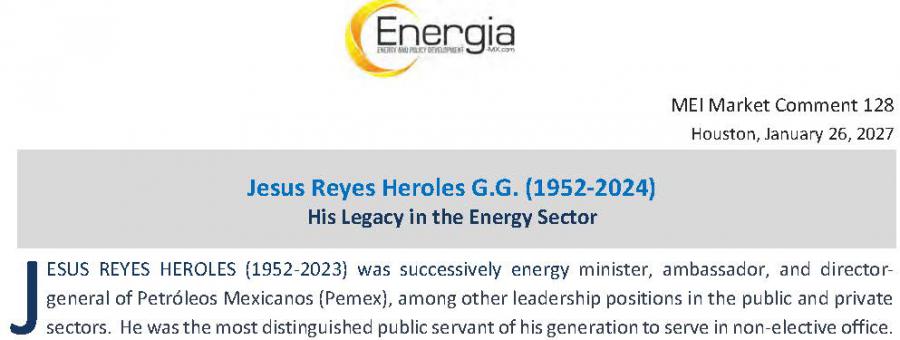
Jesús F. Reyes Heroles (1952-2024): Oil Legacy Assessed by Houston’s Baker & Associates, Energy Consultants
Jesús Reyes Heroles G. G. had two opportunities to upgrade Mexico's energy and oil narratives and policies, first as energy minister, then as Pemex CEO
HOUSTON, TX, UNITED STATES, January 30, 2024 /EINPresswire.com/ -- Jesús (Chucho) Reyes Heroles, who died on January 21 at age 72, held leadership positions in the ministries of the treasury, foreign relations, and energy. He served as cabinet minister, ambassador, and director-general of the state development bank for infrastructure (Banobras) and, later, of the national oil company (Pemex). He was the founder of a management consultancy dedicated to economic and political analysis (GEA).
He was arguably the most distinguished public servant of his generation to serve in non-elective office. He was also his generation’s most recognizable scion, benefiting from the luster of his eponymous and more famous father (1921-85), a university professor, prolific scholar, PRI ideologue, congressman, cabinet minister, and director-general of Pemex, among other roles.
The son surpassed his father in roles as ambassador, consultant, and status, after his time in public service, as a much sought-after speaker from Mexico in U.S. academic and policy forums. He had a sharp institutional memory of the politicians and policies of the federal government, one that dated back to the time before he was a teenager, when his father was elected to congress in 1961.
The oil legacy of Dr. Reyes Heroles has, in equal numbers, both admirers and detractors. Admirers recall his integrity, wit, urbanity, bilingual ease, sense of humor, and cosmopolitan flair. Critics fault his under-performance in the energy sector: Focused on technocratic, institutional, and fiscal efficiency, he lacked a vision of regulated market solutions, thus missing the forest for the trees. He never disavowed the PRI-era Petroleum Act of 1958 which eliminated price competition in petroleum products, created a Pemex monopoly, and required oil-related services to be under contract with Pemex. He did not start new public conversations about the role of the state in the energy sector.
As energy minister, 1995-97, he fumbled the privatization of Pemex’s Cosoleacaque ammonia plants, blocked by the oil syndicate. Without explanation, he was, in his words, “moved to Washington" as ambassador where he would remain for the final three years of the presidency of Ernesto Zedillo (1994-2000).
In the general elections of 2006, he supported the candidacy of PAN’s Felipe Calderon, who, as president, appointed him director general of Pemex. He developed a comprehensive strategy to reduce gasoline theft, to include its definition as a federal crime and the use of drones and satellite surveillance, but it was not implemented. As keynote speaker at Energy Day, at that time a premier industry conference, he remarked, wryly, that in Pemex’s Poza Rica facilities there were 5,000 idle employees.
In 2007, there was the fatal Usumacinta platform accident offshore. In 2008, Dr. Reyes Heroles came to Houston to speak an industry conference to promote private investment in pipelines for oil products, but neither this idea, nor that of deepwater alliances with oil companies, was included in the Energy Reform of 2008. There were rumors of furious confrontations with Energy Minister Georgina Kessel during Pemex board meetings. Without explanation, President Calderón replaced him in September 2009 by Juan José Suárez Coppel, a former Pemex CFO. Neither of them would again serve in government.
During a motor trip in 1991, returning to Mexico City from Cholula, Puebla, where he had attended a conference co-sponsored by UCLA and the University of the Americas, in the PRI mindset, yet with academic degrees from ITAM, UNAM, and MIT, he mused aloud, “There must be a price point at which oil companies would agree to serve as contractors to Pemex.”
Not until 2016, however, would Pemex have an oil company as an equity partner—but not as a contractor—and then only after the Energy Reform of 2013-14 had amended the constitution and had abrogated the anachronistic 1958 law.
In the Q&A of his presentation in 2019 at Rice University’s Baker Institute, where he was a nonresident fellow, he was asked, ”Looking back over the period 1987-2017, what would you have done different[ly] to have avoided the challenges of the energy sector [that you have just described]?” In reply, he brushed off the idea that those years could be treated as a historical period and recalled that the PRI had lost majority control of the congress in 1997, which, he insinuated, had prevented energy reforms.
He implied that there had been no policy errors or omissions for him or his generation to repent. The questioner, undeterred, urged him to write a book about the serious mistakes in those years made by economists like him in high office.
He will be missed in the U.S. as in Mexico. His patrons in the Wilson Center, CSIS, the Baker Institute, and elsewhere lament the loss of his voice and savvy. In Mexico, his hospitality, perspicacity, and good cheer will be missed by members of the inner circle of politicians and intellectuals for whom he was, for a time, the congenial host at GEA’s offices on Tuesdays for late-night discussions of public policy.
His absence will be felt by corporate boards and students and peers at the Universidad Iberoamericana, where he was coordinator of graduate studies. For those who admired him, he died too young at a time when both countries would have benefited from his knowledge and discernment.
George Baker
Baker & Associates, Energy Intelligence
+1 832-434-3828
g.baker@energia-mx.com
Visit us on social media:
Twitter
Distribution channels: Banking, Finance & Investment Industry, Business & Economy, Energy Industry, Mining Industry, Politics
Legal Disclaimer:
EIN Presswire provides this news content "as is" without warranty of any kind. We do not accept any responsibility or liability for the accuracy, content, images, videos, licenses, completeness, legality, or reliability of the information contained in this article. If you have any complaints or copyright issues related to this article, kindly contact the author above.
Submit your press release


